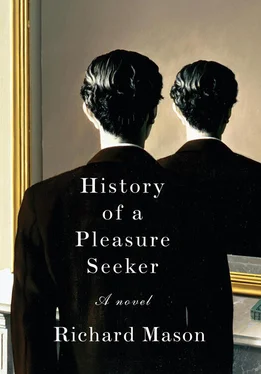No one expected an immediate miracle. His charge was willful, certainly, but he moved from task to task without rebellion. It would not be so very hard to keep him occupied. And while Egbert was occupied, he, Piet Barol, could enjoy a handsome salary and the freedoms of the best-run domestic establishment in Amsterdam. It struck him as a very pretty bargain, and with the contentment it inspired came a whisper of inspiration. He would confound Egbert’s expectations. He would never again suggest he leave the house. Forcing the child would not work; only the passage of time, and the avoidance of confrontation, might win his trust. It seemed an agreeable solution for them both, and when Egbert had finished Piet checked his translation and set him another and returned to the newspaper feeling rather jolly.
Piet Barol’s first three months at Herengracht 605 passed swiftly, and in the main to his great satisfaction, because it was true what Didier had said: Maarten Vermeulen-Sickerts ran his house like the grandest of his hotels du grand luxe ; and though time passed, the novelty of living in it did not fade for Piet Barol. Rather the reverse. He had a natural capacity for sensuous enjoyment, and no matter how often he sank into clean, pressed sheets at night, or emerged from a steaming bath to swap places with Didier Loubat, or ate suprême de foie gras from Meissen china, he savored each repetition to the full.
Sometimes he thought of the life he had left behind: the damp alcove in which he had slept, not six feet from his father’s snoring head; the meals conducted in sullen silence; the claustrophobic impossibility of change or optimism that clung to Herman Barol like a stubborn mist. In the Vermeulen-Sickerts’ household these recollections took on the quality of a fading nightmare.
Nina Barol had much regretted her impulsive decision to marry her handsome, taciturn second cousin, and for much of Piet’s life she had not troubled herself to hide this regret. Having taught music to many fashionable people in Paris, she had learned the ways of the great world and taken care that her son should know them too. Her photograph, smiling from its leather frame beside his bed, offered him daily encouragement and reminded him of her maxims. Never lose your temper. Never appear to try too hard. Learn all you can.
The service at Herengracht 605 was prompt, lavish and invisible. Nothing that passed the lips of Maarten’s family or his guests was purchased ready-made. A chef who had trained under Monsieur Escoffier in Paris oversaw the kitchen and produced meals of a quality that made Piet dread the necessity of having, ever again, to eat something made by anyone else. The family’s bed linen was changed daily and sent to be dried in the fresh-smelling fields beyond the city’s limits. Their clothes were cared for like works of art. And because Mr. Vermeulen-Sickerts deplored idleness and believed in the capacity of well-trained individuals of personal merit, all this was achieved by an indoor staff of only five servants. The chef, Monsieur la Chaume, was so well paid that he was able to keep his own house on the Egelantiersgracht.
The light chiming of the long case clock set the tempo and under orders from the magnificently efficient Mrs. de Leeuw, Didier Loubat, Agneta Hemels and Hilde Wilken laid and carried and cleared, polished and swept, bowed, smiled and poured in strict fidelity to its sweet tollings. To be served by one of them was to feel that one was at the center of a benignly ordered universe, and though Piet took care to avoid giving offense by asking for things on his own account (except, on occasion, from Hilde) he was so often with the family that he partook of their luxuries without giving the other servants any cause for resentment.
In this way, Piet was able to observe in detail the behavior of the very rich. In their steam-filled bathroom late at night, waiting to exchange places in the cooling tub, he and Didier discussed their observations with much hilarity; but while Didier was often scornful of the family he served, Piet found something noble in their excesses. He did not judge them, because he intended to emulate them one day if he could.
As the winter faded, the house slowly surrendered its secrets. Piet became familiar with the large and small drawing rooms, the walnut-paneled library with its fine edition of the Sertum Botanicum ; the parquet-floored ballroom; the stores of china and silver in the basement; and in his hours off he made drawings of the beautiful things he found in these beautiful rooms. He appreciated his surroundings with a wholeheartedness that was very flattering to Maarten Vermeulen-Sickerts, who had chosen all they contained. Only the bedrooms remained mysterious, and he sometimes watched Hilde returning from one, breakfast tray in hand, with an itching curiosity he knew he could never satisfy.
In the privacy of his cozy room, in the pleasant half hour before slipping between country-scented sheets, Piet congratulated himself on the expertise with which he had so far navigated the complexities of the household. It had helped, undoubtedly, to begin on favorable terms with the mistress of the house; but once he had negotiated his salary and received a substantial advance on it, he had not rushed to renew lingering eye contact with his master’s wife. He knew that his reticence might cause Jacobina offense and permitted himself, occasionally, to convey to her in a glance that the effort required to resist her was monumental. Otherwise he treated her with superbly appropriate deference, and she never gave any hint of expecting anything more.
This was a relief, though sometimes he found himself thinking of her as he fell asleep and getting hard at the thought of subverting her morals. He put these ideas aside in daylight hours and was punctual and humble and amusing. He played the piano after dinner and avoided Carmen and retained everything Maarten told him about the objects in his collection and never once suggested that Egbert go outside. He was wise enough to treat Naomi de Leeuw and Gert Blok with the same politesse he accorded their employers, and in time this led to many small advantages: fresh flowers in his room; a daily newspaper of his own; the gift of certain suits and shirts, perfectly stored, that no longer fit his employer.
Agneta Hemels remained an enigma, but was not sufficiently corruptible to labor on unduly; and he handled Hilde Wilken, who was jealous of his intimacy with Didier, with a gentle disdain which reminded her that she was in no position to make life difficult for him.
Piet’s greatest challenge in his first few months, just as Didier had predicted, was Constance Vermeulen-Sickerts, who was accustomed to being desired by young men and saw no reason why Piet Barol should be exempt from the general rule. She was shorter than her sister, radiantly blond, high spirited and popular, with (as Hilde told Didier, who told Piet) thick ankles she went to great lengths to keep secret.
Like her father, Constance was instinctively competitive and had devoted much effort to acquiring the power she wielded over her contemporaries. Her methods relied on the magnetism of her person and the impact she could make with it when she chose. Though she complained of living in a backwater, in fact Amsterdam’s size suited Constance — because it is easier to rule unchallenged over a duchy than an empire. Her world was the city; her stage the salons and ballrooms of its canal houses; her subjects the privileged children who had been the playmates of her youth. Like Piet, she had developed over time a highly artificial naturalness that failed to charm only the least susceptible and allowed her to triumph through seduction rather than violence. Many women, despite themselves, formed intense friendships with Constance, for she was loyal and sympathetic and listened with attention. Those who did not feared her, and were wise to do so.
Читать дальше












